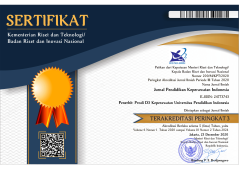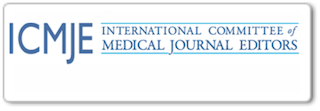Prevention of Postpartum Urinary Retention with Peppermint Oil Vapor
Abstract
Urinary retention in the postpartum period (PPUR) is one of the health problems commonly handled using catheterization and antibiotic prophylaxis. This study aimed to look at the influence of peppermint oil on PPUR prevention. This quasi-experimental study with a control group design included 60 postpartum subjects (29 in the control group and 31 in the intervention group) with vaginal delivery (ages 17-50 years). The intervention group obtained treatment by giving 2 mL of peppermint oil, while the controlled group used mineral water in the closet before subjects sat on it for 5-10 minutes and voided. The bladder condition was further checked subjectively and manually by palpation before and after the exposure to peppermint oil (distention or no distention). The relationships between variables were analyzed using the Fisher Exact statistical test, obtaining no significant effect of peppermint oil administration variables on PPUR prevention (p = 0.495, CI 95%). PPUR is related to oxidative stress, tissue inflammation, and nerve impulse blocks. Peppermint oil is estimated to be one of the modalities in preventing health problems through antioxidant, anti-inflammatory, and antispasmodic effects. Further research is needed to validate the effect of peppermint oil on PPUR prevention. In addition, support of screening information on the condition of the bladder objectively using a bladder scanner is also needed to measure the post-void residual volume (PVRV). This study showed that peppermint oil on PPUR prevention has no significant effect and may require further investigation.
Keywords
References
Ain, Q. ul, Shetty, N., & K, S. (2021). Postpartum urinary retention and its associated obstetric risk factors among women undergoing vaginal delivery in tertiary care hospital. Journal of Gynecology Obstetrics and Human Reproduction, 50(2), 1-10.
Benabdallah, A., Boumendjel, M., Aissi, O., Rahmoune, C., Boussaid, M., & Messaoud, C. (2018). Chemical composition, antioxidant activity and acetylcholinesterase inhibitory of wild Mentha species from northeastern Algeria. South African Journal of Botany, 116, 131–139.
Dawood, M. A. O., El-Salam Metwally, A., Elkomy, A. H., Gewaily, M. S., Abdo, S. E., Abdel-Razek, M. A. S., Soliman, A. A., Amer, A. A., Abdel-Razik, N. I., Abdel-Latif, H. M. R., & Paray, B. A. (2020). The impact of menthol essential oil against inflammation, immunosuppression, and histopathological alterations induced by chlorpyrifos in Nile tilapia. Fish and Shellfish Immunology, 102(May), 316–325.
Downey, J., Kruse, D., & Plonczynski, D. J. (2019). Nurses Reduce Epidural-Related Urinary Retention and Postpartum Hemorrhages. Journal of Perianesthesia Nursing, 34(1), 206–210.
Ermiati, Rustini, Rachmawati, Y., & N., I. S. (2009). Efektivitas bladder training terhadap fungsi eliminasi Buang Air Kecil (BAK) pada ibu postpartum spontan. Maj Obstet Ginekol Indones, 32 No 4, 206–211.
Gholamipourfard, K., Salehi, M., & Banchio, E. (2021). Mentha piperita phytochemicals in agriculture, food industry and medicine: Features and applications. South African Journal of Botany, 141, 183–195.
HE, H., ZHANG, S., GAO, W., LIU, Y., SHEN, W., & TAN, Z. (2021). Electroacupuncture for postpartum urinary retention: A randomized controlled study. World Journal of Acupuncture - Moxibustion, 31(3), 187–190.
Hoseini, S. M., Taheri Mirghaed, A., Paray, B. A., Hoseinifar, S. H., & Van Doan, H. (2020). Effects of dietary menthol on growth performance and antioxidant, immunological and biochemical responses of rainbow trout (Oncorhynchus mykiss). Aquaculture, 524(February), 1-7.
Jeelani, S. M., Rather, G. A., Sharma, A., & Lattoo, S. K. (2018). In perspective: Potential medicinal plant resources of Kashmir Himalayas, their domestication and cultivation for commercial exploitation. Journal of Applied Research on Medicinal and Aromatic Plants, 8(November 2017), 10–25.
Khusro, A., Aarti, C., Paray, B. A., & Agastian, P. (2020). Effect of Mentha piperita L. stress at sub-inhibitory dose on some functional properties of coagulase-negative Staphylococcus hominis. Journal of King Saud University - Science, 32(4), 2293–2300.
Lauterbach, R., Ferrer Sokolovski, C., Rozenberg, J., & Weissman, A. (2018). Acupuncture for the treatment of post-partum urinary retention. European Journal of Obstetrics and Gynecology and Reproductive Biology, 223, 35–38.
Liu, Z., Shen, C., Tao, Y., Wang, S., Wei, Z., Cao, Y., Wu, H., Fan, F., Lin, C., Shan, Y., Zhu, P., Sun, L., Chen, C., Wang, A., Zheng, S., & Lu, Y. (2015). Chemopreventive efficacy of menthol on carcinogen-induced cutaneous carcinoma through inhibition of inflammation and oxidative stress in mice. Food and Chemical Toxicology, 82, 12–18.
Li, Q., Zhu, S., & Xiao, X. (2020). The risk factors of postpartum urinary retention after vaginal delivery: A systematic review. International Journal of Nursing Sciences, Vol. 7, 484–492.
Li, Y. X., Liu, Y. B., Ma, A. Q., Bao, Y., Wang, M., & Sun, Z. L. (2017). In vitro antiviral, anti-inflammatory, and antioxidant activities of the ethanol extract of Mentha piperita L. Food Science and Biotechnology, 26(6), 1675–1683.
Maghami, M., Afazel, M. R., Azizi-Fini, I., & Maghami, M. (2020). The effect of aromatherapy with peppermint essential oil on nausea and vomiting after cardiac surgery: A randomized clinical trial. Complementary Therapies in Clinical Practice, 40, 1-10.
Mevorach Zussman, N., Gonen, N., Kovo, M., Miremberg, H., Bar, J., Condrea, A., & Ginath, S. (2020). Protracted postpartum urinary retention—a long-term problem or a transient condition? International Urogynecology Journal, 31(3), 513–519.
Mulder, F. E. M., Hakvoort, R. A., Schoffelmeer, M. A., Limpens, J., Van der Post, J. A. M., & Roovers, J. P. W. R. (2014). Postpartum urinary retention: a systematic review of adverse effects and management. International Urogynecology Journal and Pelvic Floor Dysfunction, 25(12), 1605–1612.
Oz, M., El Nebrisi, E. G., Yang, K. H. S., Howarth, F. C., & Al Kury, L. T. (2017). Cellular and molecular targets of menthol actions. Frontiers in Pharmacology, 8(JUL), 1–17.
Pavlić, B., Teslić, N., Zengin, G., Đurović, S., Rakić, D., Cvetanović, A., Gunes, A. K., & Zeković, Z. (2021). Antioxidant and enzyme-inhibitory activity of peppermint extracts and essential oils obtained by conventional and emerging extraction techniques. Food Chemistry, 338, 1-10.
Perú Biurrun, G., Gonzalez-Díaz, E., Fernández Fernández, C., & Fernández Corona, A. (2020). Post Partum Urinary Retention and Related Risk Factors. Urology, 143, 97–102.
Singh, R., Shushni, M. A. M., & Belkheir, A. (2015). Antibacterial and antioxidant activities of Mentha piperita L. Arabian Journal of Chemistry, 8(3), 322–328.
Singh, P. (2018). A Case of Prolonged Postpartum Urinary Retention: An Obstetrician’s Dilemmas’. Experimental Techniques in Urology & Nephrology, 2(4), 4–6.
Tiberon, A., Carbonnel, M., Vidart, A., Ben Halima, M., Deffieux, X., & Ayoubi, J. M. (2018). Risk factors and management of persistent postpartum urinary retention. Journal of Gynecology Obstetrics and Human Reproduction, 47(9), 437–441.
DOI: https://doi.org/10.17509/jpki.v8i1.45582
Refbacks
- There are currently no refbacks.
Jurnal Pendidikan Keperawatan Indonesia(JPKI) published by Indonesia University of Education. JPKI is licensed under a Creative Commons Attribution-ShareAlike 4.0 International License.
Office :
Nursing Department. FPOK UPI.
229, Dr. Setiabudhi Street. Bandung 40154
West Java , Indonesia
E-mail : jpki@upi.edu

_.png)
_.png)
_.png)











